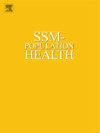当冲突遇到政治排斥:种族、治理和儿童死亡率
IF 3.1
2区 医学
Q1 PUBLIC, ENVIRONMENTAL & OCCUPATIONAL HEALTH
引用次数: 0
摘要
武装冲突对儿童健康构成重大威胁,越来越多的研究强调政治和社会结构如何能够缓和其影响,尽管有关影响调节因素的全部范围仍未完全了解。这项研究考察了冲突严重程度与5岁以下儿童死亡率之间的关系如何因种族政治代表性的模式而异。该研究利用2000年至2017年99个国家一级行政层面(ADM1)的数据,检验了冲突严重程度对缺乏政治代表性的民族居住的儿童死亡率产生更大不利影响的假设。具有ADM1和固定年效应的多元线性回归模型提供了证据,表明缺乏种族政治代表性是冲突-死亡率关系的影响调节因子。结果在可选测量、协变量、模型规范和匹配技术中仍然是稳健的。这些发现有助于理解政治不平等如何影响冲突的健康后果,对受冲突影响的卫生干预措施和解决政治代表性问题的政策都有影响。本文章由计算机程序翻译,如有差异,请以英文原文为准。
When conflict meets political exclusion: Ethnicity, governance, and child mortality
Armed conflict poses a major threat to child health, and growing research highlights how political and social structures may moderate its effects, though the full range of relevant effect modifiers remains incompletely understood. This study examines how the relationship between conflict severity and under-5 mortality rates varies depending on patterns of ethnic political representation. Using data from 99 countries from 2000 to 2017 at the first administrative level (ADM1), it tests the hypothesis that conflict severity has a stronger adverse effect on child mortality where ethnic groups that lack political representation reside. Multivariate linear regression models with ADM1 and year fixed effects provide evidence that lack of ethnic political representation operates as an effect modifier of the conflict-mortality relationship. The results remain robust across alternative measurements, covariates, model specifications, and matching techniques. These findings contribute to understanding how political inequality shapes the health consequences of conflict, with implications for both conflict-affected health interventions and policies addressing political representation.
求助全文
通过发布文献求助,成功后即可免费获取论文全文。
去求助
来源期刊

Ssm-Population Health
PUBLIC, ENVIRONMENTAL & OCCUPATIONAL HEALTH-
CiteScore
6.50
自引率
2.10%
发文量
298
审稿时长
101 days
期刊介绍:
SSM - Population Health. The new online only, open access, peer reviewed journal in all areas relating Social Science research to population health. SSM - Population Health shares the same Editors-in Chief and general approach to manuscripts as its sister journal, Social Science & Medicine. The journal takes a broad approach to the field especially welcoming interdisciplinary papers from across the Social Sciences and allied areas. SSM - Population Health offers an alternative outlet for work which might not be considered, or is classed as ''out of scope'' elsewhere, and prioritizes fast peer review and publication to the benefit of authors and readers. The journal welcomes all types of paper from traditional primary research articles, replication studies, short communications, methodological studies, instrument validation, opinion pieces, literature reviews, etc. SSM - Population Health also offers the opportunity to publish special issues or sections to reflect current interest and research in topical or developing areas. The journal fully supports authors wanting to present their research in an innovative fashion though the use of multimedia formats.
 求助内容:
求助内容: 应助结果提醒方式:
应助结果提醒方式:


